Welcome to The Build Basic Custom Closet System! In this Series, I’m showing how to make a handful of simple DIY components that come together to create a functional, beautiful custom closet space. Even better is that ALL of the cut lists are adjustable so you can quickly and easily pick and choose the type of storage you need, and size it to fit your space!
In this tutorial, I’m showing how to add a hideaway ironing station above easy our Built-in Closet Drawers. This series also includes a basic “Cubby” that houses add-ons like adjustable shelving and hanging rods, a tilt-out hamper, and pull out shoe shelving. Click around to see which organization options you’d add to your dream closet!
This post is sponsored by PureBond Plywood, the makers of the beautiful formaldehyde-free plywood I’m using to build this project. To learn more about their great products and how this series came about, click HERE.
The Build Basic Custom Closet System
Series Introduction
Basic Closet Cabinet
Adjustable Shelves and Hanging Rods
Tilt-out Hamper
Pull Out Shoe Organizer
Hideaway Ironing Station
Built-in Closet Drawers (the easy way)
TIP: Click the tabs below to see the tools, materials and cut list.
Time: 2 hours
Difficulty: Easy. The parts assemble easily with pocket holes, wood glue and hinges.
¾-inch Plywood Sides – 2 @ 8″ D x 38½” H
¾-inch Plywood Top and Bottom – 2 @ 8″ D x 20″ W
¾-inch Plywood Divider – 1 @ 6″ D x 38½” H
¾-inch Plywood Shelves – 2 @ 6″ D x 5″ W
¾-inch Plywood Door – 1 @ 39½” H x 19¾” W
¼-inch Plywood Backing – 1 @ 40″ H x 20″ W
Steps
1. Prep the Parts
Using the cut list above, cut the ¾-inch plywood pieces to size using a table saw, or a circular saw and my easy
DIY Cutting Fence. Drill pocket holes along the ends of the Side pieces. To learn more about using a Pocket Hole Jig, check out my quick
Video Tutorial.
 2. Finish the Edges
2. Finish the Edges
Before assembly, finish the front edge of the Top, Bottom, Sides, Divider and Shelves with adhesive edge banding. For a detailed tutorial on how quick and easy it is to apply edge banding, check out my
How to Finish Plywood Edges Tutorial. In addition, finish all the edges of the ¾-inch plywood Door.

3. Attach the First Side
Apply wood glue to the top and bottom edges of a Plywood Side. Position the board between the Top and Bottom with the pocket holes facing outward. Using a drill/driver, drive 1¼-inch pocket holes screws through the Side, and into the Top and Bottom boards.

4. Attach the Second Side
Apply wood glue to the ends of the remaining Side, and then place it between the Top and Bottom boards. Screw the pieces into place using a drill/driver and 1¼-inch pocket hole screws.

5. Mark the Divider Placement
Using a speed square, mark the location of the divider 5 inches from the right Side on both the Top and Bottom boards. Carry the lines to the opposite side of the Top and Bottom boards to use as a guide.

6. Install the Divider
Apply wood glue to the ends of the Divider. Place the Divider inside the assembled pieces, flush with the back edge of the pieces. Using the lines marked in Step 5, position the board to that there’s a 5-inch opening between the Divider and the Right Side Board. Now nail 1¼-inch finish nails through the Top and Bottom boards and into the ends of the Divider to hold the board in place.

7. Insert the Shelves
Mark the location of the Shelves on the right Side Wall and the Divider. Apply wood glue to the edges of the shelves, and then insert them into place. Nail through the Divider and Side Wall and into the edges of the Shelves using 1¼-inch finish nails.

8. Add the Door
Lay the Door face down in front of the assembly. Position overlay hinges in the “half overlay” position on the Bottom board and Door. While this will leave a gap below the door, it will allow it to open without scrubbing the surface below. Install the hinges using a drill/driver and the screws provided.

9. Attach the Ironing Board
Using side cutter pliers or tin snips, cut two 2-inch pieces from a roll of steel hanger tape. Clip the corner of the each piece. Place the ironing board in the raised position on the Door. Because the Divider is recessed more then the thickness of our ironing board when it’s in the lowered position, we can center the ironing board on the width of the Door. Next, bend the metal pieces over the rod that connects the front legs of the ironing board. Position the metal pieces toward the outer ends of the bar. Lower the ironing board to ensure it stays within ¾-inch of the edge of the Door, so that the door can close properly. Using a drill/driver, drive 5/8-inch wood screws through the holes in the metal pieces and into the Door.

10. Add a Magnetic Catch
Using a drill/driver, install a magnetic catch to the underside of the Top board. Install the magnetic plate on the inside of the Door aligned with the Catch to hold the door closed when in the upright position.

11. Add the Back
Apply wood glue to the back edge of the Walls, Divider, and Shelves. Lay a ¼-inch piece of plywood onto the back of the assembly. Nail though the plywood and into the edges of the Walls and Divider.

MORE BUILDING PLANS
 2. Finish the Edges
2. Finish the Edges




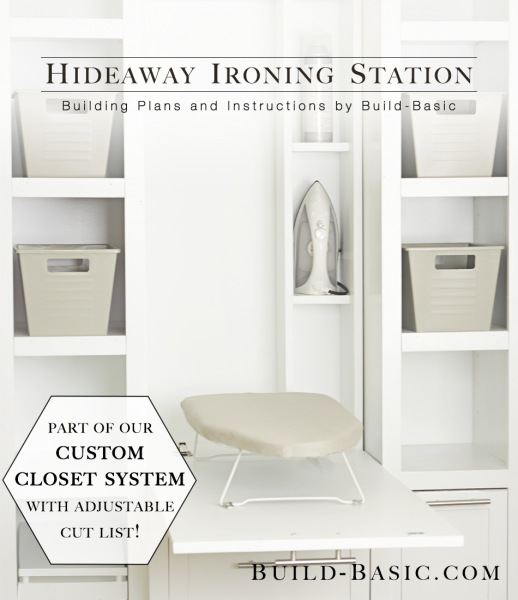
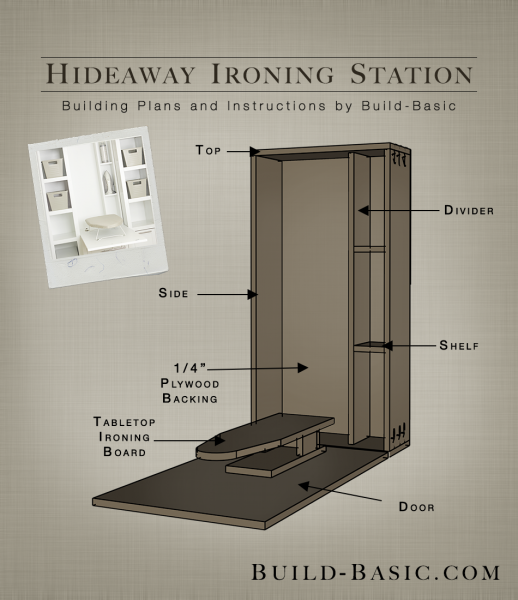


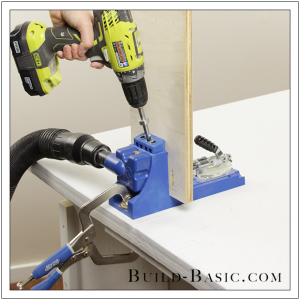
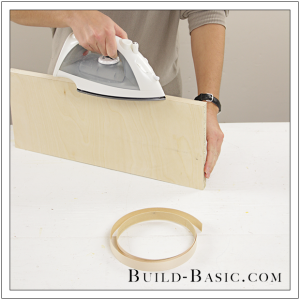
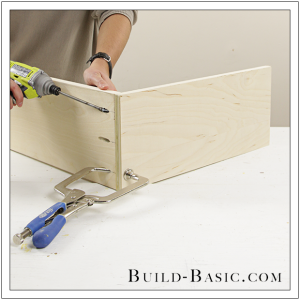
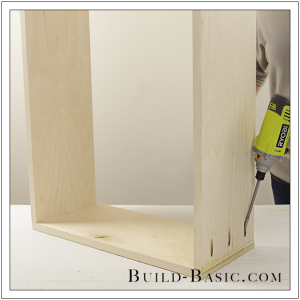
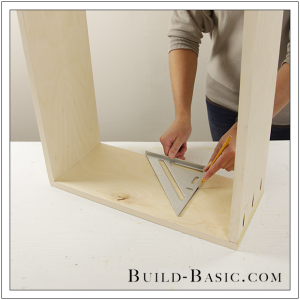
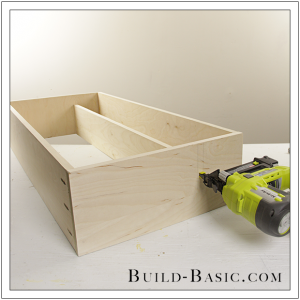
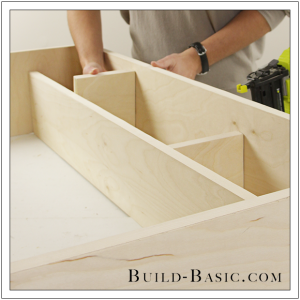
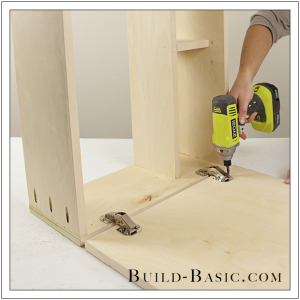
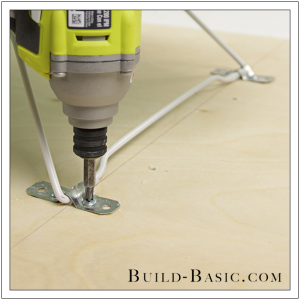
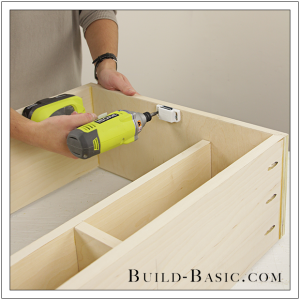
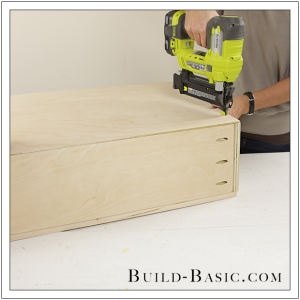
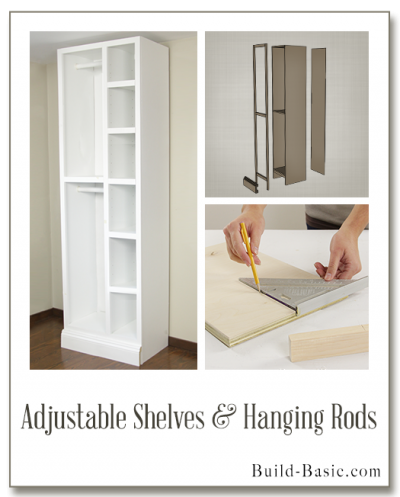
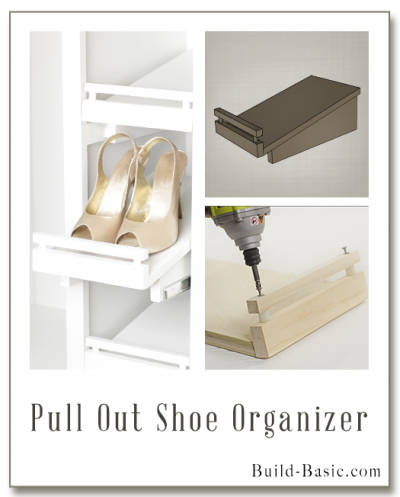
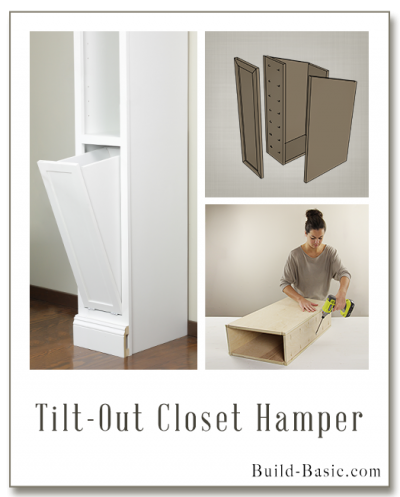
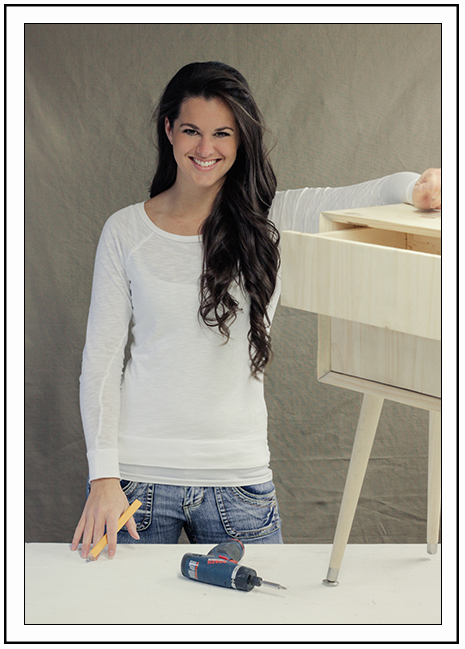





Scott Carberry
Hi Jenn, Many thanks for clarifying this, and goo to know i was on the right track!!
Taylor Searfoss
When building multiple cabinets side by side, did you build them as one piece or 2 separate and then attach together? Love these by the way. About to start on our new closet soon!
Scott Carberry
Hi Jen, great posts and tutorials, thanks for that! One question I do have, is how do these all fit together? do they simply “slide” into the basic cubby? If so how do you connect all the cubbys together and the modules within them? I ask as I want to use this to build something for my babies nursery!
Thanks again
Scott
Jenn Post author
Hi Scott,
Yes all the components fit into the general “cubbies” which can be screwed or nailed together once installed. That way——in most cases——you can tilt each component through the closet opening for installation, instead of building them in place. Let me know fi you have any other questions! I hope you’ll share photos of your project!
Thank you,
Jenn